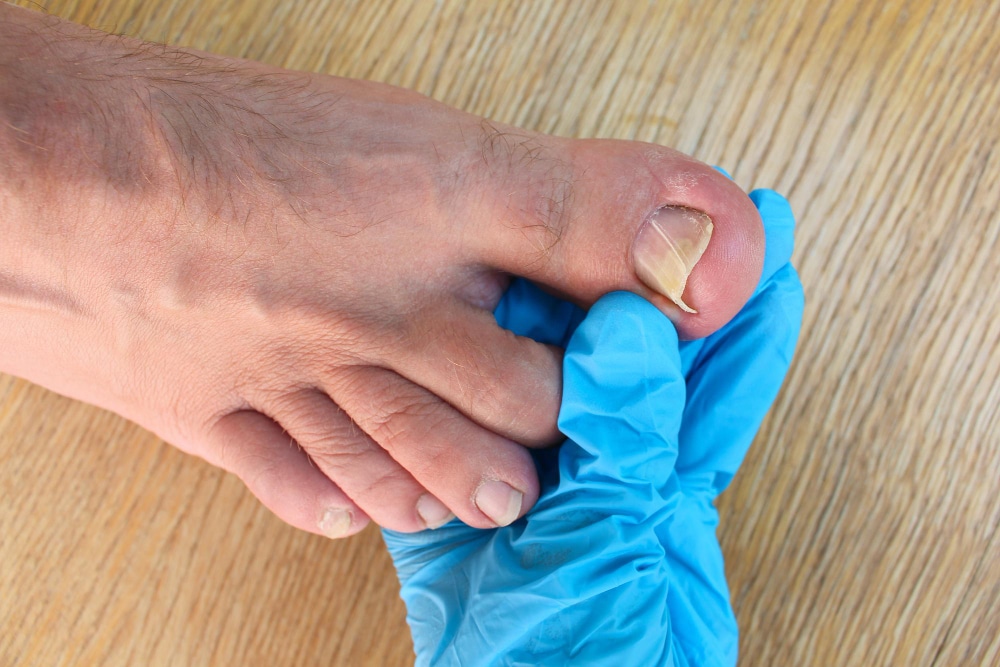Immediate Warning Signs
A nail puncture wound requires immediate attention. Watch for early infection signs within the first 24-48 hours.
Initial Signs
- Increased pain around the wound
- Redness spreading beyond the injury site
- Warmth in the affected area
- Swelling of the foot or toe
Critical Infection Symptoms
Severe Warning Signs
If you notice these symptoms, seek immediate medical care:
- Fever above 101°F
- Pus or cloudy drainage
- Red streaks extending from the wound
- Increasing pain despite treatment
Deep Tissue Infection
Watch for signs of serious complications:
- Deepening pain beneath the skin
- Difficulty moving the foot
- Numbness or tingling
- Dark or discolored skin
Tetanus Risk Factors
High-Risk Situations
Tetanus infection risk increases if:
- Your last tetanus shot was over 5 years ago
- The nail was rusty
- The wound is deep
- The injury occurred in the soil
When to Visit Emergency Care?
Seek immediate medical attention if you experience:
- Severe pain that worsens
- Inability to put weight on foot
- Signs of infection spreading
- Fever or chills
Treatment Steps
Professional Care Needed
Medical treatment typically includes:
- Wound cleaning and examination
- Tetanus shot if needed
- Possible antibiotics
- X-ray to check for debris
Do you need urgent care for a nail injury? Visit our clinic immediately. Early treatment prevents serious complications.
Remember: Never ignore signs of infection after a puncture wound. Proper medical care is essential for preventing severe complications.
What do you do if you have stepped on a nail?
Immediate Actions
Clean the wound thoroughly with clean water. Don’t remove the object if it is still embedded – seek emergency care.
First Aid Steps
- Apply gentle pressure to stop bleeding
- Clean surrounding area
- Cover with sterile bandage
- Elevate the foot
Are there other symptoms of stepping on a rusty nail than tetanus?
Other Serious Risks
- Bacterial infections
- Deep tissue damage
- Nerve injury
- Joint infections
Stepped on a Nail: Rusty Nail Concerns
Tetanus Risk Factors
- It’s time since the last tetanus shot
- Depth of wound
- Cleanliness of nail
- Delay in treatment
Infection Prevention
- Professional wound cleaning
- Antibiotics if prescribed
- Regular dressing changes
- Proper wound monitoring
5 Signs a Wound Is Serious
Emergency Warning Signs
- Excessive bleeding
- Deep puncture
- Visible debris in the wound
- Spreading infection
- Loss of sensation
Your child stepped on a nail: Next Steps
Immediate Response
- Stay calm to reassure the child
- Clean wound if possible
- Keep foot elevated
- Seek medical care
Professional Treatment
- Wound assessment
- Tetanus update
- Proper cleaning
- Antibiotics if needed
Visit our urgent care immediately for nail puncture wounds. Early treatment prevents serious complications and ensures proper healing.
Remember: All nail puncture wounds require professional medical evaluation, regardless of size or appearance.
Home remedies for stepping on a nail
Initial Care Steps
Clean the wound immediately with clean water and mild soap. Apply gentle pressure with sterile gauze to control bleeding.
Temporary Relief
Use over-the-counter pain medication and elevate your foot until you can get medical care.
I stepped on a rusty nail, and my foot hurts
Pain Significance
Persistent or increasing pain could indicate infection or tissue damage. This needs immediate medical evaluation.
Associated Symptoms
Watch for fever, redness, or warmth around the wound. These symptoms, alongside pain, suggest infection.
Best antibiotic for a nail puncture wound
Professional Assessment
Only healthcare providers can prescribe appropriate antibiotics based on wound evaluation and infection type.
Treatment Course
Antibiotics typically require a full course of 7-10 days, even if symptoms improve earlier.
I stepped on a nail and can’t walk
Immediate Concerns
The inability to bear weight suggests serious injury requiring emergency care.
Possible Complications
It could indicate tendon damage, deep infection, or joint involvement.
Puncture wound healing stages
Initial Phase
The first 24-48 hours involve cleaning, possible bleeding, and inflammatory response.
Middle Stage
Days 3-7 show decreased pain and the start of tissue repair.
Final Healing
Complete healing may take 2-4 weeks, depending on wound depth and care.
Signs of Proper Healing
Normal Progress
Gradual pain reduction and improved mobility indicate good healing.
Warning Signs
Increased pain, swelling, or drainage suggest complications needing medical attention.
Remember: Visit our urgent care clinic immediately for proper wound care and infection prevention.

